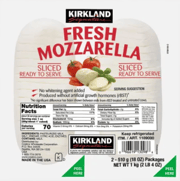
What if we told you those so-called “scraps” you’ve been tossing are actually tiny powerhouses waiting to work wonders around your home? From freshening up your kitchen to adding some zing to your wellness routine, these golden leftovers are anything but waste. They can stretch your budget, support your health, and tackle everyday messes with surprising ease.
Packed with potent compounds, you’ve been discarding an ingredient that has the potential to boost your well-being and transform your home routine—one zest-filled trick at a time.
Household cleaning that won't break the bank
With household budgets under pressure, creating your own cleaning products makes perfect financial sense.
Ready to turn lemon scraps into cleaning gold? Let’s dive into a hack that’s as smart as it is sustainable.
All-purpose citrus spray
By simply saving your citrus peels and soaking them in vinegar, you can keep a batch of natural cleaner brewing at all times. This DIY solution is a multitasking marvel, especially when it comes to cutting through greasy kitchen surfaces and lifting stubborn smudges off walls.
It’s an easy, low-cost way to turn food scraps into a powerful household ally.
Simply place peels in a large jar, cover with white vinegar, seal tightly, and leave for two to three weeks. Then strain through muslin cloth before transferring to a spray bottle. The natural oils and acids in lemon peels create a powerful degreasing agent that rivals expensive commercial cleaners.
Microwave cleaning made simple
For grimy microwaves, add lemon peels to a microwave-safe bowl with boiling water.
Microwave on high for five minutes—the citrus-infused steam will loosen stubborn splatters, making cleanup effortless. The citric acid cuts through grease naturally, and you'll be left with a fresh, clean scent.
Garbage disposal freshener
Drop leftover peels into your garbage disposal, turn on the tap, and run for 30 seconds. The natural oils neutralise odors while the texture helps clean the blades. For extra effectiveness, add ice cubes to help scrape off residue.
Safety tips for seniors
Always wash lemons thoroughly before using peels to remove pesticide residue
Test homemade cleaners on a small area first
If you have sensitive skin, wear rubber gloves when handling citrus cleaners
Store DIY cleaning solutions in clearly labelled containers
Never mix different cleaning products together
Kitchen and food preparation uses
Natural cutting board sanitizer
Cutting boards absorb strong odors from garlic and onions, but lemon peels can help.
After cleaning your board with warm soapy water, sprinkle coarse salt over the surface and scrub with a halved, squeezed lemon. The antibacterial substances in lemon peel inhibit microorganism growth and fight oral-disease-causing bacteria.
Let sit for 10 minutes, then rinse thoroughly.
Homemade lemon extract
Create your own flavoring agent by removing just the zest from lemon peels (discard the bitter white pith) and steeping it in vodka for six weeks.
This homemade extract can be stored for up to four years and costs a fraction of shop-bought versions.
Lemon-infused olive oil[/h3]
For a gourmet touch, gently warm olive oil with lemon zest for 10 minutes—don't let it simmer.
This creates a bright, complex flavored oil, perfect for salads or roasted vegetables. Use about one cup of oil per lemon's worth of zest.
Also read: 20 Kitchen tricks chefs say will change the way you cook.
Garden and outdoor applications
Natural plant fertilizer
Lemon peel contains calcium, which is important for bone tissue, and ascorbic acid may aid in managing osteoporosis. These same nutrients benefit your garden.
Dry the peels completely, grind them into powder, and sprinkle over soil. The gradual breakdown releases magnesium, calcium, and potassium.
Alternatively, soak peels in water for seven hours to create liquid fertilizer. Note that this will lower soil pH, making it perfect for acid-loving plants like azaleas and blueberries, but not suitable for alkaline-preferring plants like lavender.
Natural pest deterrent
The strong aroma of citrus peels can act as a natural insect repellent due to bitter compounds in the rind.
You can gently swipe lemon peels across your skin or leave them in areas where bugs tend to gather. Their natural oils and citrus scent act as a mild repellent, helping to keep pesky insects at bay without relying on chemical sprays. This works particularly well for spiders—the chemical compounds disrupt their sensory receptors.
Creative household uses
Natural air freshener
Fill a large pot with water, add generous handfuls of lemon peels, and bring to boil.
Studies suggest that the scent of citrus may play a role in enhancing mental clarity and easing stress, making it a simple yet effective addition to your wellness routine.
To create a cozy, uplifting atmosphere—especially during colder months—try pairing citrus peels with warming ingredients like cinnamon sticks, fresh ginger, or sprigs of rosemary. Together, they create a naturally soothing blend that supports both mood and mindfulness.
Ice cube flavoring
Create refreshing flavored ice cubes by placing small pieces of lemon peel in ice cube trays with water, lemonade, or fruit juice. These add subtle citrus flavor to drinks while looking decorative.
Metal polish
The acidic properties make lemon peels excellent for polishing chrome and stainless steel fixtures.
Simply rub the cut side over taps and handles—the citric acid breaks down mineral deposits and greases naturally.
Rinse with warm water and dry with a soft cloth for a sparkling finish.
Barbecue flavor enhancer
During barbecue season, add lemon peels (pith removed) to hot coals. As they char, they'll release aromatic oils that infuse your food with subtle smoky citrus flavors—perfect for fish, chicken, or vegetable skewers.

Health benefits that matter after 60
The research on lemon peels reveals some remarkable benefits particularly relevant for seniors.
Studies involving healthy older adults aged 60-85 found that citrus peel compounds can significantly improve cognitive function, with participants showing enhanced memory scores after 12 months.
For those concerned about bone health, lemon peels offer a double bonus. Rich in both calcium and vitamin C, these peels may help prevent osteoporosis, with research showing ascorbic acid can help treat bone disorders.
Given that osteoporosis affects adults aged 50 and above—and an estimated 10 million are living with the condition—this natural boost is worth considering.
Lemon peels pack a surprising punch when it comes to immune support.
Rich in antioxidants, they help reinforce your body’s natural defenses, making it easier to fend off illness and recover from infections and diseases. Research also shows that consuming 1–2 grams of vitamin C daily can reduce the severity and duration of colds by about 8% in adults.
Preserving and storing your lemon peels
Freezing for future use
Wash lemons thoroughly before juicing, then spread peels on parchment-lined baking sheets without touching.
Once frozen, transfer to containers. This keeps them fresh for months and ensures no waste.
Drying methods
For long-term storage, dry peels completely in direct sunlight or use a food dehydrator.
Ground dried peels create versatile seasoning blends or can be stored for future cleaning projects.
The versatility of lemon peels means you're not just reducing waste—you're creating a sustainable household routine that saves money and potentially supports your health as you age.
From cognitive benefits to bone health, natural cleaning to garden care, these bright yellow scraps deserve a second life.
Whether you're batch-making cleaning solutions, experimenting with flavored oils, or simply freshening your garbage disposal, every peel you repurpose is a small victory for both your wallet and the environment.
What's your favorite way to repurpose lemon peels? Have you discovered any clever uses we haven't mentioned? Share your citrus wisdom in the comments below—we'd love to hear how you're making the most of your lemons!






